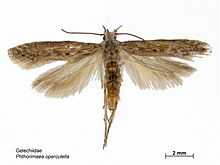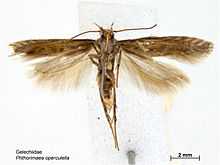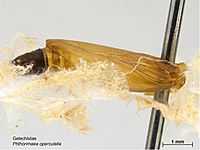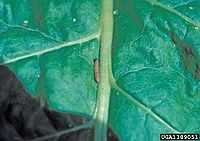Phthorimaea operculella
| Potato tuber moth | |
|---|---|
 | |
| Dorsal view | |
 | |
| Ventral view | |
| Scientific classification | |
| Kingdom: | Animalia |
| Phylum: | Arthropoda |
| Class: | Insecta |
| Order: | Lepidoptera |
| Family: | Gelechiidae |
| Subfamily: | Gelechiinae |
| Tribe: | Gnorimoschemini |
| Genus: | Phthorimaea |
| Species: | P. operculella |
| Binomial name | |
| Phthorimaea operculella (Zeller, 1873) | |
| Synonyms | |
| |
The Potato tuber moth (Phthorimaea operculella), also known as the tobacco splitworm, is a major pest on potatoes in New Zealand and South Africa. It has a world-wide distribution.


The body length is about 10mm and the wingspan is about 12mm. The larva is called potato tuberworm.
In South Africa, the spider Selenops radiatus has proved to be an effective controlling agent for this species. The wasp Diadegma mollipla, which exists in South Africa, is a parasite of the moth's larvae.[1]
The potato tuberworm is becoming a pest in North Carolina. It seems to be interchangeable in the Solanaceae family. In tobacco, the larvae are leaf miners and can cause severe damage to leaves, making them weigh less.
An older synonym is Bryotropha solanella, where solanella stands for its host, the potato (Solanum tuberosum).
| Wikimedia Commons has media related to Phthorimaea operculella. |
References
- ↑ "Diadegma mollipla (Holmgren)". waspweb.org. Retrieved 2013-09-16.